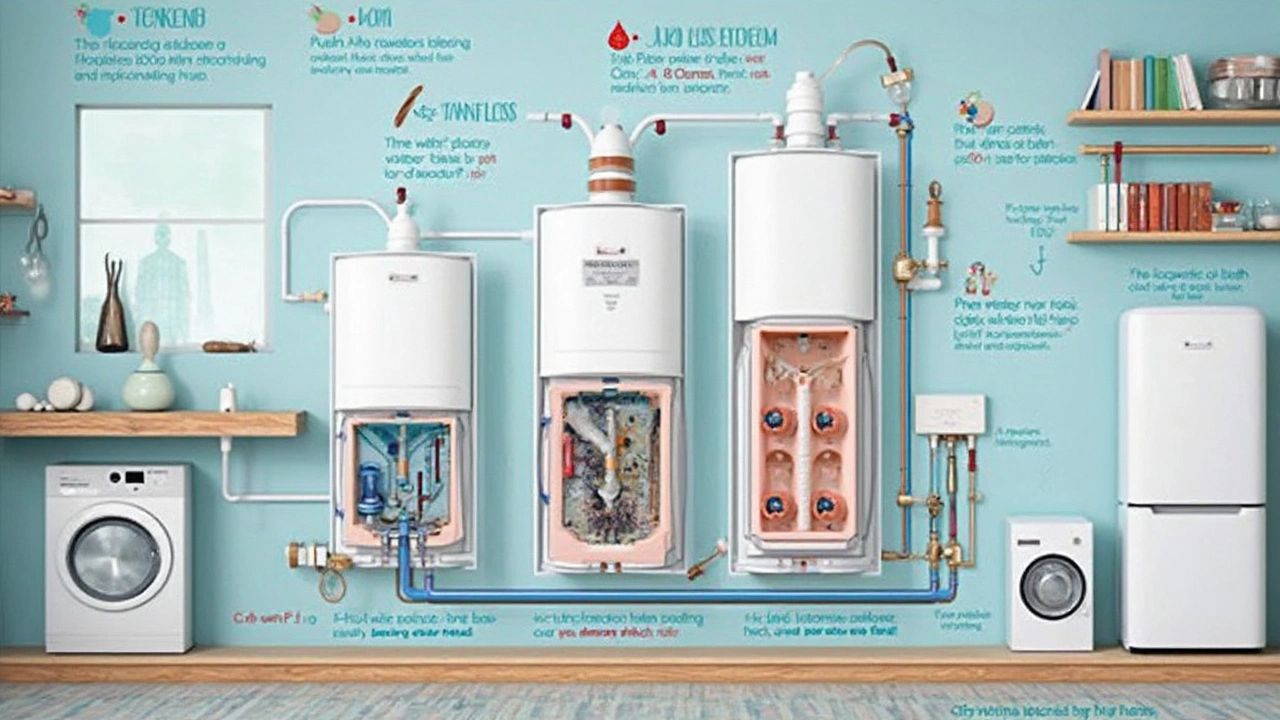Ever wonder if your water heater’s days are numbered? If you’re like most people, you probably don’t think about it—until you’re faced with an icy shower or a mini flood. Water heaters don’t last forever, but knowing what to expect puts you ahead of the game. No one wants a busted tank in the middle of winter.
So, how long does a typical water heater keep working? It actually depends a lot on the model and how you treat it. Some tanks chug along well past the average, while others croak early, especially if maintenance gets skipped. Even something as simple as the kind of water running through your pipes can make a big difference.
The good news? There are steps you can take to squeeze more years out of your water heater—and avoid those cold shower surprises. You don’t need to be a plumber to spot trouble early or keep things running smoothly. Let’s break down the basics, clear up some myths, and give you clear signs it might be time to call in the pros—or go shopping for a new one.
- Average Lifespan by Water Heater Type
- Common Reasons Water Heaters Fail
- How to Make Your Water Heater Last Longer
- Warning Signs Your Water Heater Is Failing
- Is It Better to Repair or Replace?
Average Lifespan by Water Heater Type
If you’re trying to figure out how long your water heater will last, the first thing to check is the type you have. Different models run for different lengths of time, and the numbers might surprise you. Here’s a quick breakdown to see where your setup stands.
| Water Heater Type | Typical Lifespan (Years) | What Affects It? |
|---|---|---|
| Tank (Gas) | 8–12 | Water quality, maintenance, usage |
| Tank (Electric) | 10–15 | Element health, hardness of water |
| Tankless (On-Demand) | 15–20+ | Filtration, scaling, maintenance |
| Heat Pump (Hybrid) | 10–15 | Filter changes, climate |
| Solar | 15–20 | Climate, regular servicing |
The old-school tank models—both gas and electric—are what you find in most homes. Gas ones usually tap out in about 8 to 12 years, mainly because the burner and tank get worn down. Electric tanks last a little longer, but hard water can chew them up faster if you don’t flush them out once in a while.
Tankless models (those “on-demand” heaters) are built with fewer moving parts that wear out. Some tankless owners see theirs run smoothly for 20 years or more, especially with regular descaling. That’s double the life of most regular tanks. Hybrids (heat pump models) and solar units hang in there about as long as good-quality electric tanks, but they do need a bit more love and maintenance.
No matter what type you have, the biggest factors are water quality and routine care. If you’re in an area with hard water or you skip regular checks, your heater’s lifespan drops. On the flip side, if you keep up with the basics—like periodic flushing, filter swaps, and spotting leaks early—you can stretch that life out and get your money’s worth from your water heater life expectancy.
Common Reasons Water Heaters Fail
Most water heaters don’t just quit out of nowhere. There’s usually a reason. Once you know what to look for, you can spot trouble before you’re left with a freezing shower. Here are the top culprits when it comes to water heater breakdowns:
- Corrosion: Probably the number one killer. Over time, water eats away at the inside of your tank. If the anode rod (a part meant to rust instead of your tank) gets used up and isn’t replaced, corrosion speeds up fast. This can lead to leaks or even floods.
- Mineral Buildup: Hard water packs your tank with minerals like calcium and magnesium. As these pile up at the bottom, your heater has to work overtime—and parts wear out sooner. A noisy tank or less hot water are big clues.
- High Water Pressure: If water pressure’s too strong, it puts extra stress on your tank, causing leaks or cracks down the road.
- Faulty Heating Elements: Electric heaters rely on these. When they wear out or burn up, the water’s lukewarm at best—or outright cold.
- Poor Maintenance: Skipping regular checkups lets all these problems pile up. Most people never drain their tank or check the pressure valve, but doing so can really stretch out the life of your heater.
It helps to know how long your heater should last. Here’s a snapshot of the most common types, so you can see how lifespan lines up with the risk factors above:
| Type | Average Lifespan (Years) | Main Reason for Failure |
|---|---|---|
| Tank (Gas) | 8 - 12 | Corrosion, mineral buildup |
| Tank (Electric) | 10 - 15 | Heating element burnout |
| Tankless | 15 - 20 | Mineral buildup, overheating |
If you really want to boost your heater’s lifespan, don’t ignore those yearly checkups. Swapping out the anode rod, flushing the tank, or keeping the water pressure in check can mean several extra years before you deal with a big repair or replacement. Smarter maintenance now saves a lot of money and headaches later.

How to Make Your Water Heater Last Longer
Boosting the lifespan of your water heater isn’t rocket science—you just need a little know-how and a bit of consistency. Small actions can add years to your tank and save you cash down the road. A few minutes of upkeep each year can make a huge difference.
- Flush your tank every year. Sediment builds up fast, especially if you’ve got hard water. That grime settles at the bottom and makes your heater work overtime, which leads to early failures. Draining a few gallons every 12 months flushes a lot of junk out.
- Check the anode rod. This metal rod inside your tank sacrifices itself to protect against rust. Once it’s mostly eaten away (usually after 3-5 years), replacing it keeps the inside from corroding. If you skip this step, expect rust and leaks a lot sooner.
- Set the temp to 120°F (49°C). Many heaters default hotter, but 120°F is hot enough for comfort and slow enough to prevent scale buildup. Any higher, and you’re just stressing out the system—and risking scalding, too.
- Test the pressure relief valve. This part stops your tank from turning into a water bomb. Pull the lever once a year to make sure it’s not stuck. If no water gushes out, swap it fast.
- Wrap up in insulation. Old tanks and pipes lose heat, making them run more often. Simple insulating blankets or foam sleeves reduce standby losses and save wear and tear (plus a few bucks on the energy bill).
Want numbers? Take a look at some real data that show how these steps help extend performance:
| Maintenance Task | Extra Years Added (on average) |
|---|---|
| Annual Tank Flush | 2-3 years |
| Anode Rod Replacement | 4-5 years |
| Lowering Temp to 120°F | 1-2 years |
| Insulation | 0.5-1 year |
Stick to these habits, and your water heater life expectancy goes up for real. A lot of folks see their tanks last past the 12-year mark just by following these simple routines. A little effort now seriously pays off later.
Warning Signs Your Water Heater Is Failing
If your water heater is acting weird, don’t ignore it. Catching problems early could save you a lot of hassle (and money). Most units give off clues before they quit on you completely. Here are the biggest red flags:
- Hot water runs out faster than usual – If you’re used to long, hot showers but suddenly get cold halfway through, your heater’s probably struggling inside.
- Funny noises from the tank – Knocking, popping, or rumbling often mean mineral deposits have built up. These deposits make the heater work harder and break down faster.
- Rusty or cloudy water – Rust-colored or cloudy water coming from your hot taps usually points to corrosion inside the tank. If it gets worse, you might spot tiny flakes of metal, which is bad news.
- Leaks around the base – Even a small puddle under the tank can spell trouble. Leaks often mean the tank has cracked or the pressure inside is too high. Either way, it’s a ticking time bomb.
- Water just won’t get hot – If adjusting the thermostat doesn’t help, you could have a broken heating element, thermostat, or something even bigger. Old age is a common reason things just give out.
Here’s a quick snapshot of what to watch for and what it could mean:
| Warning Sign | Possible Cause | What To Do |
|---|---|---|
| Rumbling or popping sounds | Mineral buildup | Flush tank, call a pro if noise returns |
| Rusty water | Tank corrosion or failing anode rod | Check/replace anode rod, consider replacing unit |
| Pooling water | Internal tank leak or faulty valve | Turn off water & power, call for repair or replacement |
| No hot water | Heating element failure, bad thermostat | Test elements/thermostat, consider repair if unit is younger |
| Short hot water supply | Age, buildup, undersized tank | Flush tank, discuss upgrades if family or use has grown |
A quick tip: Most regular water heaters last about 8–12 years. If yours is getting up there in age and showing these symptoms, it’s usually a sign it’s time for something new. If you want to stay ahead of cold showers and surprise floods, keep an eye out for these changes. The sooner you spot them, the fewer headaches you'll have later on.

Is It Better to Repair or Replace?
If your water heater starts acting up, you have to make a call: fix it, or kick it to the curb and buy a new one? The answer depends on a few key things—mostly age, repair costs, and safety risks.
First, age really matters. Most standard tank models live about 8-12 years, while tankless models usually stick around for 15-20 years. If your heater is nearing its average lifespan (or past it), pouring money into repairs doesn’t make much sense. Think of it like an old car—if the big stuff keeps breaking, it might be time to upgrade instead of patching it up.
| Water Heater Type | Average Lifespan (Years) | Common Repair vs. Replace Point |
|---|---|---|
| Gas Tank | 8 - 12 | 10+ years, major parts fail |
| Electric Tank | 10 - 15 | 12+ years, leaks or rust |
| Tankless | 15 - 20 | 15+ years, constant issues |
Next, look at cost. If the repair bill is more than half the price of a new unit, replacing is almost always smarter. Water heaters lose efficiency as they age, so newer units often pay for themselves by lowering your energy bills. Also, constant repairs can add up—if you’re calling a plumber every few months, you’re probably wasting money.
Don’t ignore safety issues. Serious leaks, obvious corrosion, weird smells, or clanking noises can be signs of real problems. If your tank has rusted through, don’t bother fixing it—that’s a flood waiting to happen. And if there are electrical issues or gas leaks, replacement is safer.
- If your heater is still under warranty, repairs make sense (they’re often free or cheap).
- For younger heaters (under 8 years), fixing a single broken part is usually worth it.
- If you see rusty water, puddles, or the heater can’t keep up anymore, it’s probably time to start shopping.
If your goal is to avoid cold showers and keep costs down, here’s a super simple rule: If your unit is as old as a middle schooler and having big problems, replacing beats repairing most times. But don’t rush to dump a newer heater over a minor issue.
It comes down to how old the unit is, how much repairs cost, and how reliable you want your hot water to be. If you’re not sure what makes sense, call a pro to check it out—they can give you the best advice based on your situation and the water heater life expectancy you can expect from your model.


